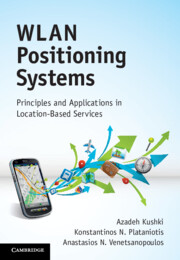2 - Location-based services
from Part I - History and applications
Published online by Cambridge University Press: 05 February 2012
Summary
Traditionally, the application scope of positioning systems was limited to target tracking and navigation in civilian and military applications. This has changed in past decades with the advent of mobile computing. In particular, the maturation of wireless communication and advances in microelectronics have given birth to mobile computing devices, such as laptops and smart phones, which are equipped with sensing and computing capabilities. The mobility of these computing devices in wireless networks means that users' communication, resource, and information needs now change with their physical location. More specifically, location information is now part of the context in which users access and consume wireless services. This, together with the availability of positioning information (for example, through the Global Positioning System), both necessitated and enabled the development of services that cater to the changing needs of mobile users [34]. This need has sparked a new generation of applications for positioning known as location-based services (LBS) or location-aware systems. Formally, LBS have been defined in many ways [24, 50, 80]. In this book, the term LBS is used to indicate services that use the position of a user to add value to a service [50].
In this chapter, we will discuss the economical and ethical implications of LBS. We begin with an assessment of the market potential for these services (Section 2.1). This is followed by a discussion of application areas where LBS services can be employed (Section 2.2). Finally, we discuss the ethical implications of LBS (Section 2.3).
- Type
- Chapter
- Information
- WLAN Positioning SystemsPrinciples and Applications in Location-Based Services, pp. 12 - 29Publisher: Cambridge University PressPrint publication year: 2012
- 1
- Cited by



